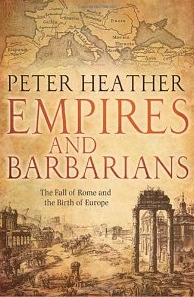Empires and Barbarians: The Fall of Rome and the Birth of Europe
Heather’s wonderful The Fall of the Roman Empire serves as a prelude to this fascinating, thorough study of the end of Rome and the development of what came to be Europe. The idea of Europe as a continent or a trading zone is not dictated by geography and was, in point of fact, a very late development and, Heather argues convincingly, was by no means ordained by geography or demographics. Heather shows convincingly that the transition from late antiquity to the Medieval economy sharply reduced wealth inequality, ending a long dynamic of competition at the fringes of empire because the scale of economic development had ceased to be so starkly uneven.
We know astonishingly little about the Barbarian peoples, either in terms of their history or their material culture. No one today has any idea what language the Huns spoke or just what they thought they were trying to do. No one really knows where the Russians came from, though the fact that "Rus" derives from the Finnish word for "Swede" is suggestive. The crucial fact of very late antiquity is the emergence of Slavic Europe in the East, but no one knows where the Slavs came from or how they lived and our memory of what must have been tumultuous events is limited to a few dim fables told about half-remembered missionaries. But Heather shows that the traditional notion that people did move is both plausible and probable; that Vandals left Germanic Europe to wind up in North Africa is far from unlikely in a world where we are quite certain that millions of Irish people left home for North America and millions of Rwandans left home for anywhere they could go. People leave when they must, or when opportunities seem vastly better in the developed world; in antiquity, that developed world was the Mediterranean economic zone.
